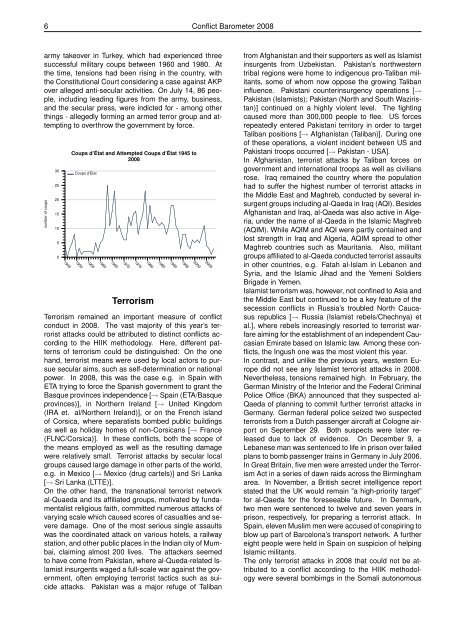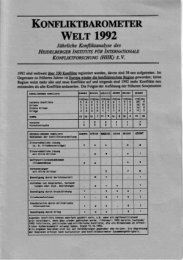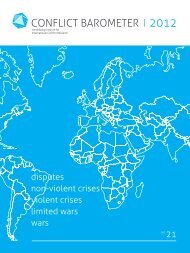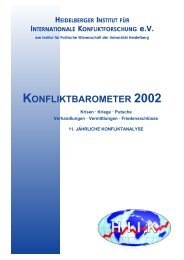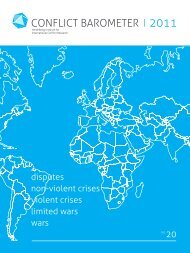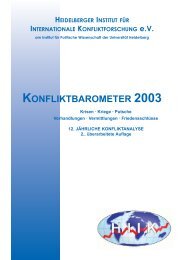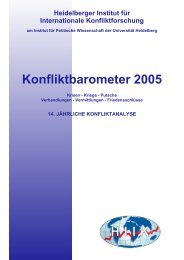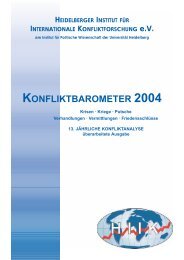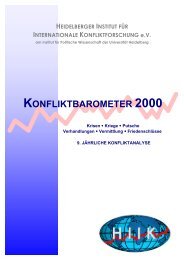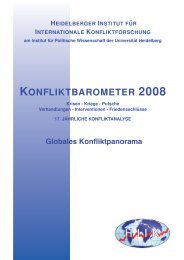CONFLICT BAROMETER 2008
CONFLICT BAROMETER 2008
CONFLICT BAROMETER 2008
Create successful ePaper yourself
Turn your PDF publications into a flip-book with our unique Google optimized e-Paper software.
6 Conflict Barometer <strong>2008</strong><br />
army takeover in Turkey, which had experienced three<br />
successful military coups between 1960 and 1980. At<br />
the time, tensions had been rising in the country, with<br />
the Constitutional Court considering a case against AKP<br />
over alleged anti-secular activities. On July 14, 86 people,<br />
including leading figures from the army, business,<br />
and the secular press, were indicted for - among other<br />
things - allegedly forming an armed terror group and attempting<br />
to overthrow the government by force.<br />
number of coups<br />
30<br />
25<br />
20<br />
15<br />
10<br />
5<br />
0<br />
1945<br />
Coups d’État and Attempted Coups d’État 1945 to<br />
<strong>2008</strong><br />
Coups d’État<br />
1950<br />
1955<br />
1960<br />
1965<br />
1970<br />
1975<br />
1980<br />
Terrorism<br />
Terrorism remained an important measure of conflict<br />
conduct in <strong>2008</strong>. The vast majority of this year’s terrorist<br />
attacks could be attributed to distinct conflicts according<br />
to the HIIK methodology. Here, different patterns<br />
of terrorism could be distinguished: On the one<br />
hand, terrorist means were used by local actors to pursue<br />
secular aims, such as self-determination or national<br />
power. In <strong>2008</strong>, this was the case e.g. in Spain with<br />
ETA trying to force the Spanish government to grant the<br />
Basque provinces independence [→ Spain (ETA/Basque<br />
provinces)], in Northern Ireland [→ United Kingdom<br />
(IRA et. al/Northern Ireland)], or on the French island<br />
of Corsica, where separatists bombed public buildings<br />
as well as holiday homes of non-Corsicans [→ France<br />
(FLNC/Corsica)]. In these conflicts, both the scope of<br />
the means employed as well as the resulting damage<br />
were relatively small. Terrorist attacks by secular local<br />
groups caused large damage in other parts of the world,<br />
e.g. in Mexico [→ Mexico (drug cartels)] and Sri Lanka<br />
[→ Sri Lanka (LTTE)].<br />
On the other hand, the transnational terrorist network<br />
al-Quaeda and its affiliated groups, motivated by fundamentalist<br />
religious faith, committed numerous attacks of<br />
varying scale which caused scores of casualties and severe<br />
damage. One of the most serious single assaults<br />
was the coordinated attack on various hotels, a railway<br />
station, and other public places in the Indian city of Mumbai,<br />
claiming almost 200 lives. The attackers seemed<br />
to have come from Pakistan, where al-Queda-related Islamist<br />
insurgents waged a full-scale war against the government,<br />
often employing terrorist tactics such as suicide<br />
attacks. Pakistan was a major refuge of Taliban<br />
1985<br />
1990<br />
1995<br />
2000<br />
2005<br />
.<br />
from Afghanistan and their supporters as well as Islamist<br />
insurgents from Uzbekistan. Pakistan’s northwestern<br />
tribal regions were home to indigenous pro-Taliban militants,<br />
some of whom now oppose the growing Taliban<br />
influence. Pakistani counterinsurgency operations [→<br />
Pakistan (Islamists); Pakistan (North and South Waziristan)]<br />
continued on a highly violent level. The fighting<br />
caused more than 300,000 people to flee. US forces<br />
repeatedly entered Pakistani territory in order to target<br />
Taliban positions [→ Afghanistan (Taliban)]. During one<br />
of these operations, a violent incident between US and<br />
Pakistani troops occurred [→ Pakistan - USA].<br />
In Afghanistan, terrorist attacks by Taliban forces on<br />
government and international troops as well as civilians<br />
rose. Iraq remained the country where the population<br />
had to suffer the highest number of terrorist attacks in<br />
the Middle East and Maghreb, conducted by several insurgent<br />
groups including al-Qaeda in Iraq (AQI). Besides<br />
Afghanistan and Iraq, al-Qaeda was also active in Algeria,<br />
under the name of al-Qaeda in the Islamic Maghreb<br />
(AQIM). While AQIM and AQI were partly contained and<br />
lost strength in Iraq and Algeria, AQIM spread to other<br />
Maghreb countries such as Mauritania. Also, militant<br />
groups affiliated to al-Qaeda conducted terrorist assaults<br />
in other countries, e.g. Fatah al-Islam in Lebanon and<br />
Syria, and the Islamic Jihad and the Yemeni Soldiers<br />
Brigade in Yemen.<br />
Islamist terrorism was, however, not confined to Asia and<br />
the Middle East but continued to be a key feature of the<br />
secession conflicts in Russia’s troubled North Caucasus<br />
republics [→ Russia (Islamist rebels/Chechnya) et<br />
al.], where rebels increasingly resorted to terrorist warfare<br />
aiming for the establishment of an independent Caucasian<br />
Emirate based on Islamic law. Among these conflicts,<br />
the Ingush one was the most violent this year.<br />
In contrast, and unlike the previous years, western Europe<br />
did not see any Islamist terrorist attacks in <strong>2008</strong>.<br />
Nevertheless, tensions remained high. In February, the<br />
German Ministry of the Interior and the Federal Criminal<br />
Police Office (BKA) announced that they suspected al-<br />
Qaeda of planning to commit further terrorist attacks in<br />
Germany. German federal police seized two suspected<br />
terrorists from a Dutch passenger aircraft at Cologne airport<br />
on September 29. Both suspects were later released<br />
due to lack of evidence. On December 9, a<br />
Lebanese man was sentenced to life in prison over failed<br />
plans to bomb passenger trains in Germany in July 2006.<br />
In Great Britain, five men were arrested under the Terrorism<br />
Act in a series of dawn raids across the Birmingham<br />
area. In November, a British secret intelligence report<br />
stated that the UK would remain ”a high-priority target”<br />
for al-Qaeda for the foreseeable future. In Denmark,<br />
two men were sentenced to twelve and seven years in<br />
prison, respectively, for preparing a terrorist attack. In<br />
Spain, eleven Muslim men were accused of conspiring to<br />
blow up part of Barcelona’s transport network. A further<br />
eight people were held in Spain on suspicion of helping<br />
Islamic militants.<br />
The only terrorist attacks in <strong>2008</strong> that could not be attributed<br />
to a conflict according to the HIIK methodology<br />
were several bombimgs in the Somali autonomous


